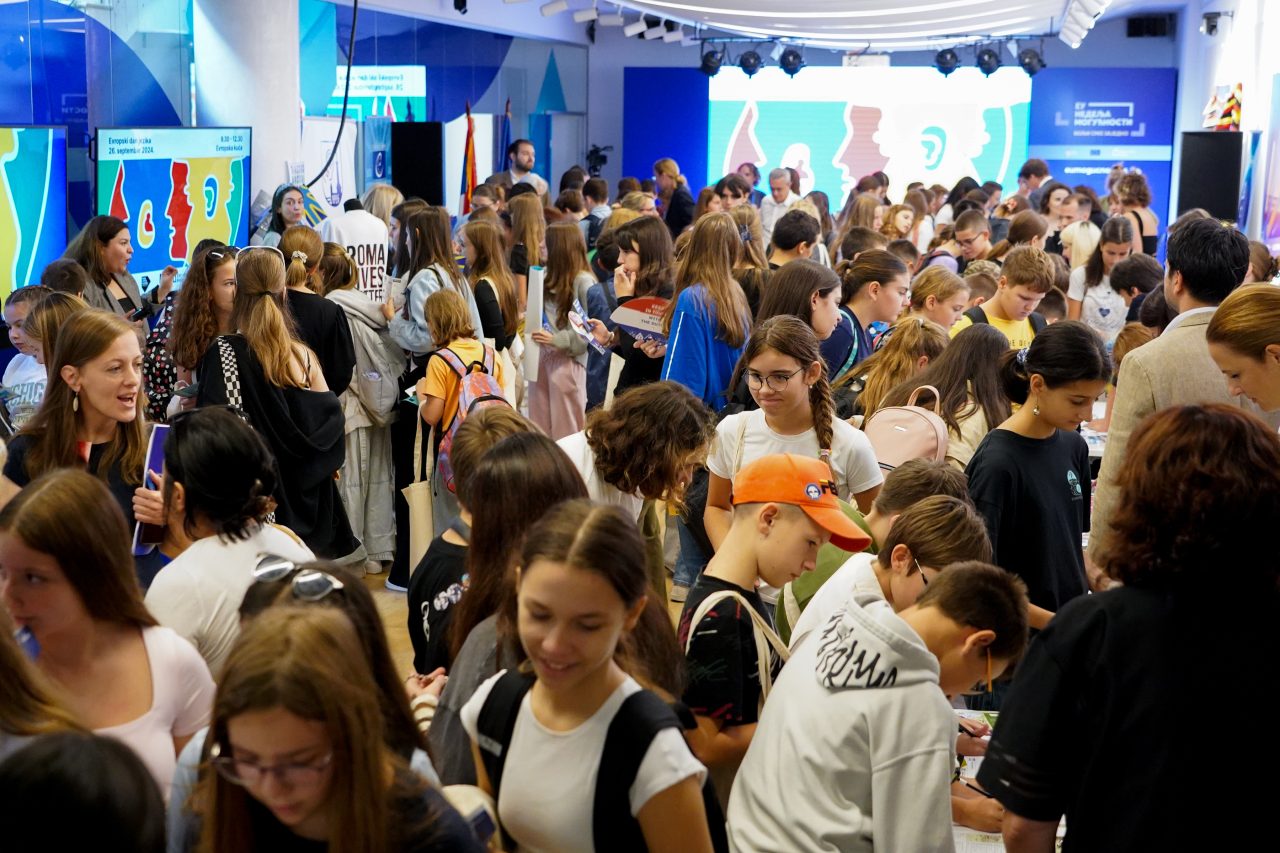
The European Day of Languages was held at the newly opened Europe House, a new vibrant meeting place for culture and ideas. About 1,000 children aged 12 to 18 had the opportunity to learn about the importance of learning foreign languages through games and quizzes, while all visitors could explore the diversity of Europe. Children received a “language passport” and a bag upon entry, collected stamps in their passports, and won attractive prizes in raffles provided by various cultural institutes and embassies.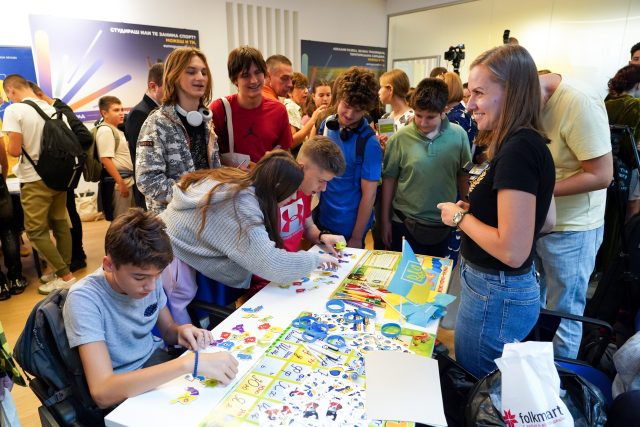
This year’s event, designed as an interactive experience, was organized by the EUNIC Serbia network in cooperation with the Council of Europe, the Delegation of the European Union, the Children’s Cultural Center Belgrade, and the Ministry of European Integration. 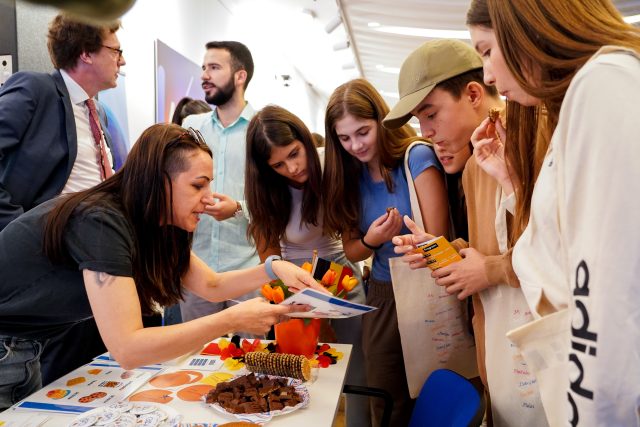 “Linguistic diversity is a precious part of our cultural heritage, which strengthens our appreciation of differences and highlights the power of diversity,” said Klaus Neukirch, Director of Program Cooperation at the Council of Europe.
“Linguistic diversity is a precious part of our cultural heritage, which strengthens our appreciation of differences and highlights the power of diversity,” said Klaus Neukirch, Director of Program Cooperation at the Council of Europe. 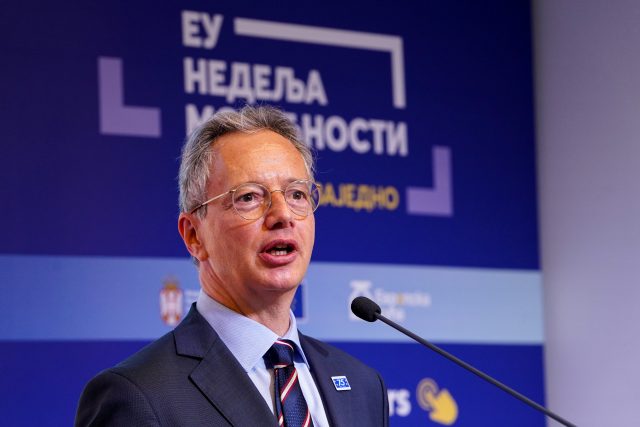 The event featured the participation of 22 countries and organizations, presenting more than 19 languages, including Serbian Sign Language and Romani. The Council of Europe encourages citizens across Europe’s 46 member states to learn languages regardless of age or environment.
The event featured the participation of 22 countries and organizations, presenting more than 19 languages, including Serbian Sign Language and Romani. The Council of Europe encourages citizens across Europe’s 46 member states to learn languages regardless of age or environment.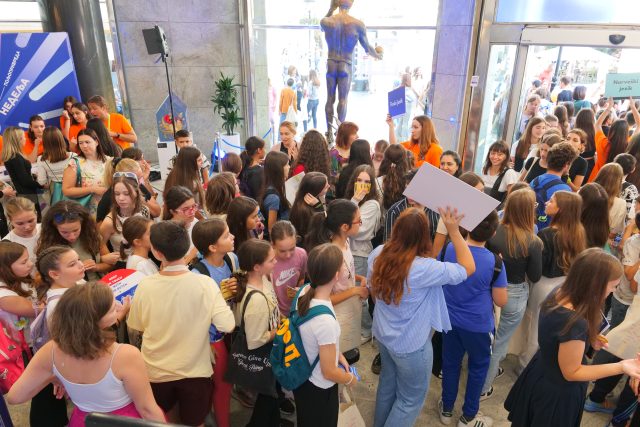 “The European Day of Languages is a joint initiative of the EU and the Council of Europe through which we celebrate the richness and diversity of European languages—over 200 languages are spoken across Europe, while the EU currently has 24 official languages. This year’s program was organized with the EUNIC Serbia network—a network of cultural institutes from EU member states and wider Europe, along with the Children’s Cultural Center Belgrade and the Ministry of European Integration—with the aim of offering school children mini language classes, knowledge quizzes, and valuable prizes: language courses!” emphasized Plamena Halacheva, Deputy Head of the EU Delegation to Serbia, during the opening of this year’s event.
“The European Day of Languages is a joint initiative of the EU and the Council of Europe through which we celebrate the richness and diversity of European languages—over 200 languages are spoken across Europe, while the EU currently has 24 official languages. This year’s program was organized with the EUNIC Serbia network—a network of cultural institutes from EU member states and wider Europe, along with the Children’s Cultural Center Belgrade and the Ministry of European Integration—with the aim of offering school children mini language classes, knowledge quizzes, and valuable prizes: language courses!” emphasized Plamena Halacheva, Deputy Head of the EU Delegation to Serbia, during the opening of this year’s event.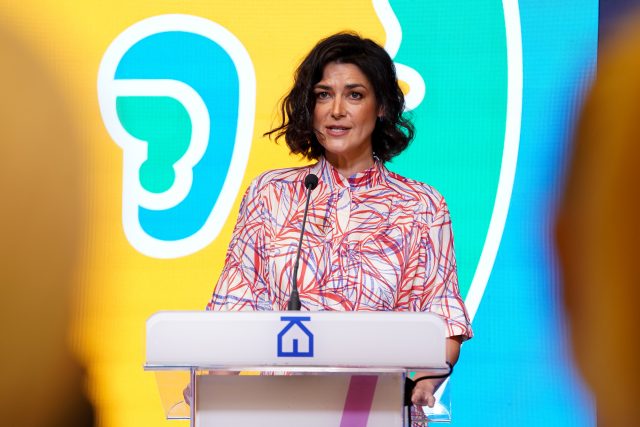 Mila Ćipović Gligorić, Assistant Minister for European Integration, highlighted that the European Union is based on multilingualism and that the languages of each EU member state are equal. “Citizens of the European Union, in addition to their mother tongue, speak two official EU languages, and a lot is invested in the educational system and language learning projects,” said Ćipović Gligorić.
Mila Ćipović Gligorić, Assistant Minister for European Integration, highlighted that the European Union is based on multilingualism and that the languages of each EU member state are equal. “Citizens of the European Union, in addition to their mother tongue, speak two official EU languages, and a lot is invested in the educational system and language learning projects,” said Ćipović Gligorić.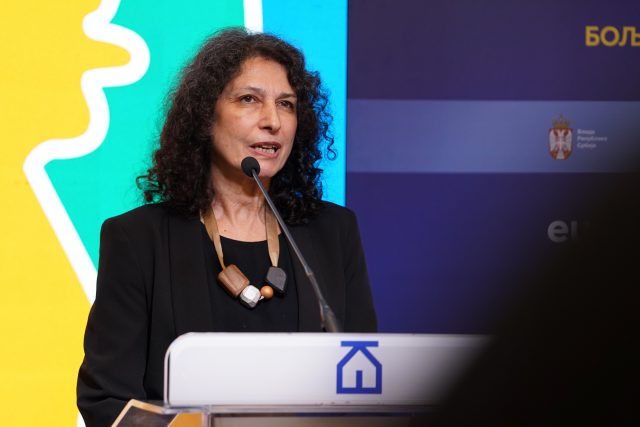
“Learning languages is a wealth for every individual as well as a right of every individual. Besides striving to provide quality language education in primary and secondary schools, we are also committed to preserving our own language,” said Dr. Aleksandar Jović, Assistant Minister for International Cooperation and European Integration in the Ministry of Education, expressing satisfaction with the number of participants at the event.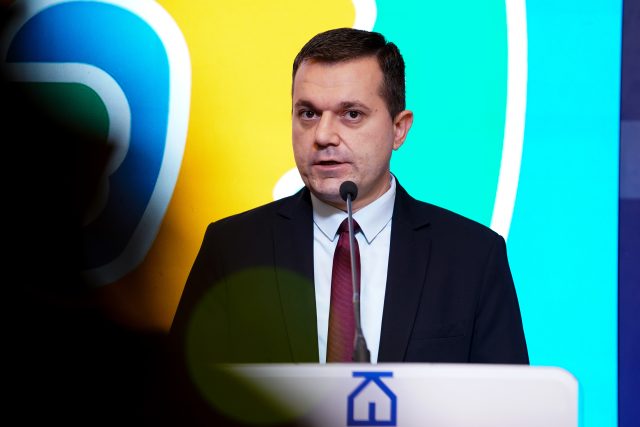 The European Day of Languages was supported by EUNIC Serbia, representing the collaboration of 21 European cultural institutes and embassies in Serbia, as well as the European House.
The European Day of Languages was supported by EUNIC Serbia, representing the collaboration of 21 European cultural institutes and embassies in Serbia, as well as the European House. 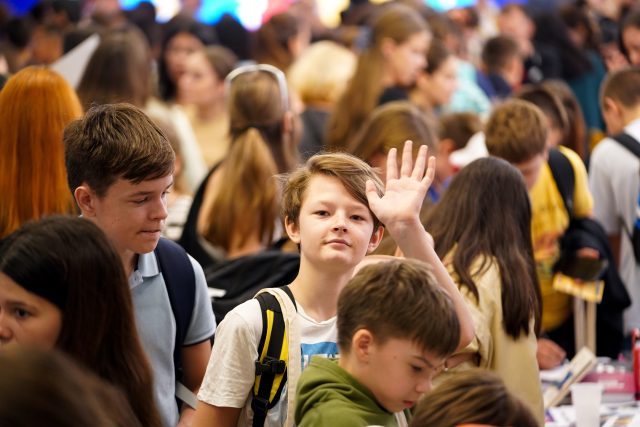
“EUNIC Serbia, representing the network of cultural embassies and institutes in Serbia, is the main coordinator of the event, in cooperation with the Council of Europe. The goal of the event is to showcase our diversity and the colorful variety of languages across Europe, to gather children and others to enjoy together,” said Lucie Orbok from the Czech Cultural Center.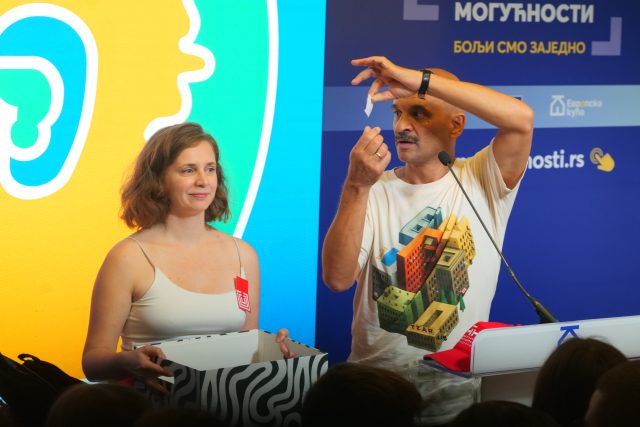 Part of the event was dedicated to Duško Radović, who created the “Dictionary of Friendship,” selecting fifteen of the most beautiful words that, as he said, connect all the children of Europe and the world: child, bread, game, book, love, mother, peace, father, song, friend, bird, joy, freedom, sun, and Europe. Children could choose which of the three languages they wanted to learn these words in, using associations, games, musical instruments, movements, and pantomime.
Part of the event was dedicated to Duško Radović, who created the “Dictionary of Friendship,” selecting fifteen of the most beautiful words that, as he said, connect all the children of Europe and the world: child, bread, game, book, love, mother, peace, father, song, friend, bird, joy, freedom, sun, and Europe. Children could choose which of the three languages they wanted to learn these words in, using associations, games, musical instruments, movements, and pantomime.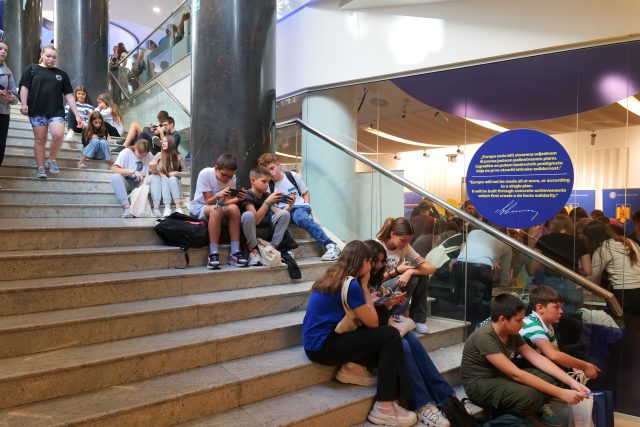
“The Children’s Cultural Center has the honor of being one of the organizers and local partners in the organization of the European Day of Languages. We are preparing for the regional event ‘Joy of Europe,’ where we expect guests from most countries who will also be present today. We find volunteers here and introduce them to foreign languages, thereby facilitating communication with guests from the diaspora and abroad,” said Ružica Ćuković from the Children’s Cultural Center.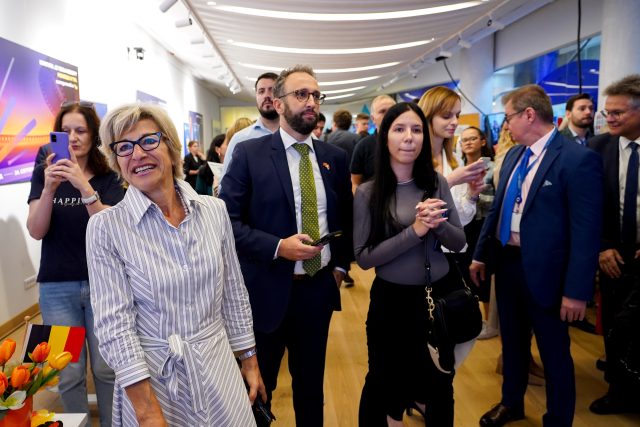 The European Day of Languages is celebrated every year on September 26, since 2001, at the initiative of the Council of Europe in cooperation with the European Commission.
The European Day of Languages is celebrated every year on September 26, since 2001, at the initiative of the Council of Europe in cooperation with the European Commission.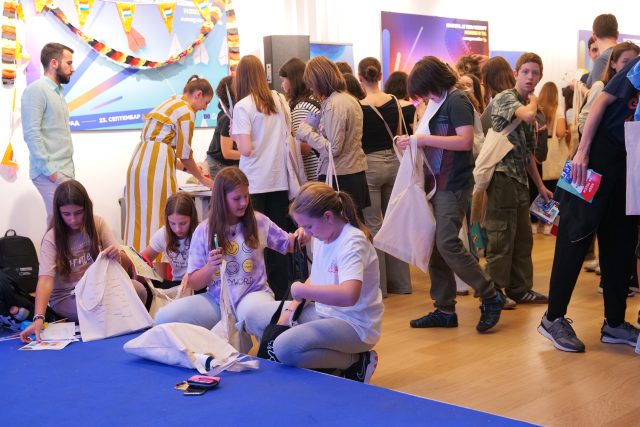 This year’s participants included the Embassy of Finland, Embassy of Slovenia, Embassy of Sweden, Embassy of Romania, Embassy of Portugal, Embassy of Ukraine, Embassy of Belgium, Embassy of the Netherlands, Czech Center, Embassy of Poland, Collegium Hungaricum, Italian Cultural Institute, French Institute, Yunus Emre Institute, Cervantes Institute, British Council, Hellenic Foundation for Culture, Goethe-Institut, EU Delegation to Serbia, Council of Europe, Ministry of European Integration, Children’s Cultural Center Belgrade, City Organization of the Deaf Belgrade, and European Roma Institute for Arts and Culture.
This year’s participants included the Embassy of Finland, Embassy of Slovenia, Embassy of Sweden, Embassy of Romania, Embassy of Portugal, Embassy of Ukraine, Embassy of Belgium, Embassy of the Netherlands, Czech Center, Embassy of Poland, Collegium Hungaricum, Italian Cultural Institute, French Institute, Yunus Emre Institute, Cervantes Institute, British Council, Hellenic Foundation for Culture, Goethe-Institut, EU Delegation to Serbia, Council of Europe, Ministry of European Integration, Children’s Cultural Center Belgrade, City Organization of the Deaf Belgrade, and European Roma Institute for Arts and Culture. 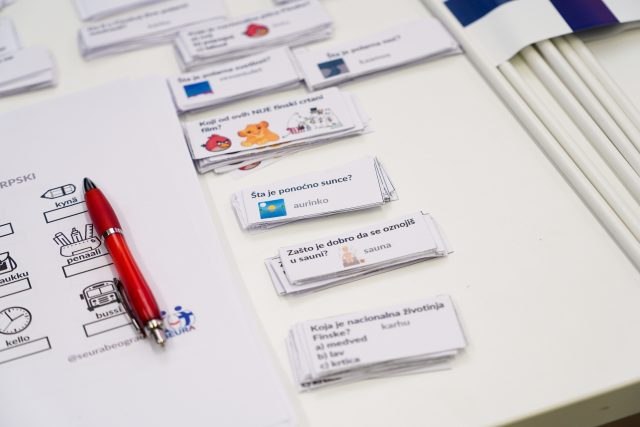 The European Day of Languages (EDL) was first celebrated in 2001 during the European Year of Languages. At the end of this campaign, the Committee of Ministers of the Council of Europe decided that EDL would be an annual event, celebrated every September 26. Each year, millions of people in the Council of Europe member states and beyond organize or participate in activities promoting linguistic diversity and the ability to speak other languages.
The European Day of Languages (EDL) was first celebrated in 2001 during the European Year of Languages. At the end of this campaign, the Committee of Ministers of the Council of Europe decided that EDL would be an annual event, celebrated every September 26. Each year, millions of people in the Council of Europe member states and beyond organize or participate in activities promoting linguistic diversity and the ability to speak other languages.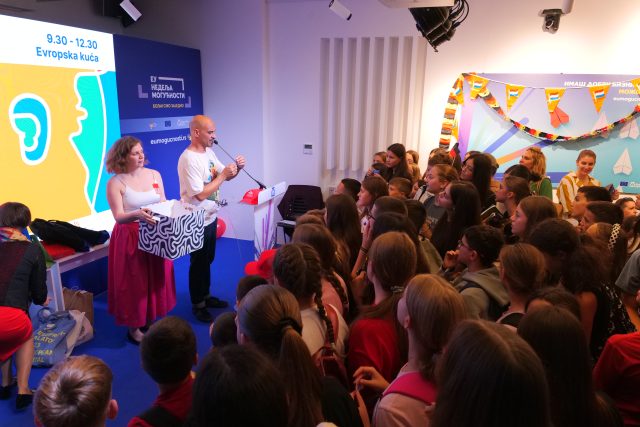
Photo: European House

